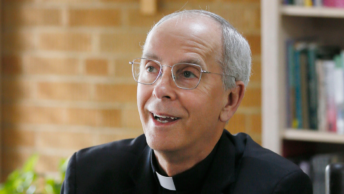
“As for me and my household, we will serve the Lord.” This is the essence of what it means to be a believer. Whom do we serve? Ultimately, it is God. However, sometimes we go astray and fall in the trap of serving other “gods”—power, prestige, lust, money, popularity, etc. When we feed these other entities, we leave little room to nourish our relationship with God.
The second reading from the letter to the Ephesians is a beautiful expression of the mystery of marriage. Just as in the Eucharist, Jesus nourishes us with His Body and Blood, so too in the sacrament of Marriage should the spouses mutually nourish one another. I remind couples at weddings how they are responsible for one another’s salvation. When a husband says “I do” to his wife, he is saying that he will do everything possible to assist her in getting to heaven. When a wife says “I do” to her husband, she is agreeing to help him in whatever way possible to achieve the heavenly kingdom. And if God gifts them with children, they will assist them on their road to salvation.
This is not to say that we are not responsible for our own salvation. Ultimately, Jesus Christ is our salvation; however, we have free will and intellect. We choose to accept or reject that salvation. If we accept Jesus as our Lord and Savior, we will demonstrate that acceptance by the way in which we live our lives. Moreover, we should accept the challenge of leading others to God’s Kingdom. In other words, we are called to be faithful disciples who bear witness to the Lord by our words and actions.
When Jesus speaks of giving his very body and blood as life for the world, some of his disciples were unable to accept it. They could not comprehend that someone would be that self-less that he would give his very life for the sake of others. Jesus becomes the food that nourishes us for eternal life. In turn, we lead others to Christ by our lives. How many of you make sacrifices in order that your spouse or children or parents might have a better life? How many of you put another person’s needs before your own? Why do you do this: out of love.
Holy Orders, like Marriage, is a sacrament of service. Instead of serving one’s spouse and children, the deacon, priest or bishop is called to serve a larger community. He is there to give his life so that others may have life. Like Joshua, the ordained minister serves the community in a position of leadership. And for this, he often takes a lot of guff. In his effort to be of service, he is challenged, criticized, ignored, and sometimes killed for following the dictates of God. On the flip side, however, through his preaching and lifestyle, he can be a great source of comfort, stability, and witness.
When a person becomes married or is ordained, that person is accepting the responsibility to serve the Lord. Married couples should try to mutually love, honor and respect each other. Ordained ministers should try to love their congregations as Christ loves the Church. Married couples should mutually assist one another in getting to heaven while ordained ministers should lead their flock in the way of eternal life.
The real challenge of living the Bread of Life discourse boils down to the concept of sacrifice: Are we willing to give of our very selves so that another person may have life? Are we willing to die so that another might live?








